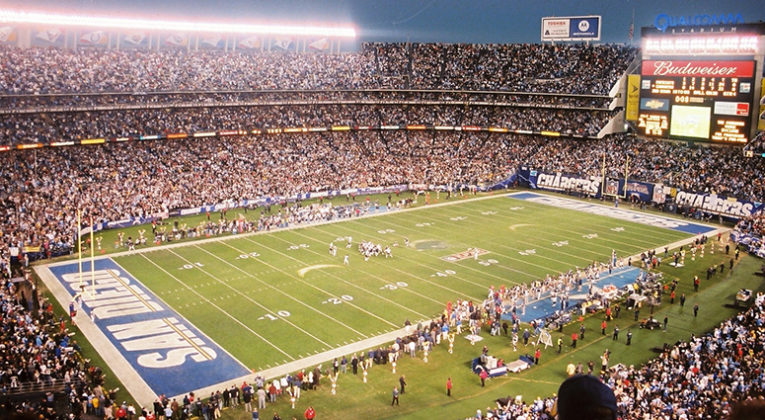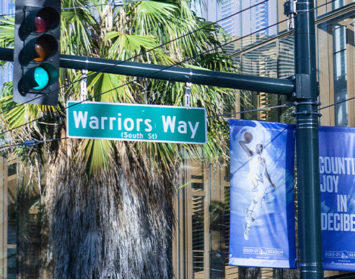Editor’s Note, February 2, 2015: While a lot has changed in the last 9 years, Jason still hopes to keep the Chargers in San Diego, whether that’s in Mission Valley or downtown. As a member of the newly appointed Citizens’s Stadium Advisory Group – aka the “Chargers Task Force” – he looks forward to helping work toward a solution.
By Jason Hughes
A dream that came true 45 years ago for the city of San Diego could easily become a nightmare for America’s Finest City if, in fact, the San Diego Chargers eventually move from the hometown they’ve occupied since 1961.
There are all sorts of nail-biting scenarios in which the team would move to Los Angeles, Las Vegas and elsewhere out of the region. Even San Antonio has been mentioned, in which case I predict “Remember the Alamo!” would displace “Charge!” as the team’s war cry — especially during a losing season.
Locally — and I use that term rather inclusively — there’s talk about the club moving elsewhere in the county. Last month, Mayor Jerry Sanders proposed allowing the team to look at other county venues in a well-intended effort to at least keep the NFL franchise in the county.
The city of Chula Vista and several private landowners have signaled their interest in exploring the possibility of building a new stadium somewhere in that South County city. National City also has expressed interest, but that small burg has just two problems. First, it’s National City. Second, the city has no space for a stadium. The devil’s in the details, you know.
On the other hand, Chula Vista is an urbanizing metropolis with land aplenty for all sorts of regional amenities, including, I assume, a major stadium complex.
The city’s only drawbacks are that it is not the city of San Diego and that its first name would surely evoke informal but common monikers such as “Chula Chargers” and the like. I’m reminded of the Angels becoming slurred as the “Orangels” when that baseball team moved from Los Angeles to Orange County many years ago. Besides, a good percentage of San Diegans and other Charger fans speak Spanish and know well that “Chula” means “pretty,” “nice” or “graceful” — hardly words that depict the Chargers as a fighting football machine.
Chula Vista and other venues aside, what’s abundantly clear in all this is that both the city and club need the Chargers to stay in the city of San Diego — specifically Mission Valley. It’s way too premature and rude besides to open the door and ask the team not to let the doorknob hit them in the butt on the way out.
There’s more than civic pride involved here. The city has a major asset at stake in where the San Diego Chargers end up geographically. The 166-acre site on which Qualcomm Stadium sits in the heart of Mission Valley is worth hundreds of millions of dollars.
What happens if the Chargers leave the city and that site because we fail to provide the team with a more suitable stadium? Whether the Chargers stay or go, we have a large obsolete concrete structure that needs to be torn down and replaced to accommodate anything more than the San Diego State Aztecs and assorted destruction derbies. Without the Chargers, the stadium property will fall into disuse for the most part. The much-mocked ticket guarantee deal of a few years back pales in comparison to the civic idiocy that would allow this real estate asset to become so underutilized.
The city and Chargers both need a new stadium, but neither party has found the financial capacity to build what it would take to accommodate a major league football team for the next several decades. What the city does have is the site and with some creative thinking, the possibility of leveraging that real estate into a solution that benefits both the city and Chargers organization.
Let’s consider a scenario in which, once the property is appraised, the city makes available a goodly share of that land to the Spanos family to redevelop — including replacing the stadium with a new NFL and Super Bowl venue. The city then receives tax revenues and development fees on what is now private property and the Spanos family pays the city back the value of what was made available as the property they control is developed.
While this idea is overly general and lacks specifics, it is at least worth pursuing. We haven’t explored a partnership option between the city and Chargers to redevelop what is arguably one of the most precious real estate assets in the region. And we need to.
This or any other scenario involving how to redevelop the existing site will take considerable negotiations expertise on the part of the city — lest we fall prey to another ticket guarantee fiasco. San Diego has benefited me in so many ways personally and in my business over the years. So I am volunteering to represent the city in its negotiations with the Chargers to find a way to keep the team in a new stadium on its present site — pro bono publico.
For Raiders fans and others culturally challenged, that means free, without charge.
Jason Hughes is founder of Hughes Marino, an award-winning commercial real estate company with offices across the nation. A pioneer in the field of tenant representation, Jason has exclusively represented tenants and buyers for more than 30 years. Contact Jason at 1-844-662-6635 or jason@hughesmarino.com to learn more.










